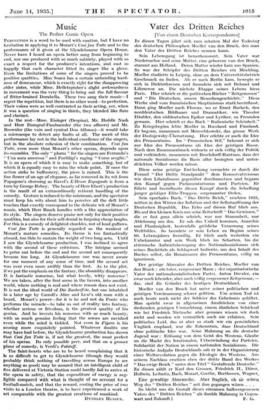Music
The Perfect Comic Opera - PERFECTION is a word to be used with caution, but I have no hesitation in applying it to Mozart's Cosi fan Tulle and to the performance of it given at the Glyndebourne Opera House. Never have I heard an opera better sung from beginning to end, nor one produced with so much subtlety, played with so exact a respect for the producer's intentions, and cast so • happily that each character fitted its singer like a glove. Even the limitations of some of the singers proved to be positive qualities. Miss Souez has a certain unbending hard- ness of demeanour, which is exactly right for the disapproving -elder sister, while Mme. Helletsgruber's slight awkwardness in movement was the very thing to bring out the full flavour of flitter-brained Dorabella. These two sang their music—I regret the repetition, but there is no other word—to perfection. Their voices were as well contrasted as their acting, yet, when it was a question of singing in thirds, they blended like flute and clarinet..
In the rest—Mme. Eisinger (Despina), Mr. Heddle Nash and Herr Domgraf-Fassbaender (the two officers) and Mr. Brownlee (the vain and cynical Don Alfonso)—it would take a microscope to detect any faults at all.. The merit of this performance lay not in the individual excellence of the singers, but in the absolute cohesion of their combination. Cosi fan Tutte, even more than Mozart's other operas, depends upon its ensembles. The only " plums " for the singers are Ferrando's " Una aura amorosa " and Fordiligi's raging " Come scoglio." It is an opera of which it is easy to make something, but of which it is equally easy to miss the whole point. If once the action sinks to buffoonery, the piece is ruined. This is the fine flower of an age of elegance, as far removed in its wit from Papageno's clowning as Ravel's L'Heitre Espagnole is from a turn by George Robey. The beauty of Herr Ebert's production is the result of an extraordinarily reticent handling of the comedy. Gesture is reduced to the minimum, and the spectator must keep his wits about him to perceive all the deft little touches that exactly correspond to the delicate wit of Mozart's music, which Herr Busch handles with a like appreciation of its style. The singers deserve praise not only for their positive qualities, but also for their self-denial in forgoing cheap laughs. For this is a comedy of delighted chuckles, not of loud guffaws.
Cosi fan Tulle is generally regarded as the weakest of Mozart's mature comedies. Its theme is too fantastically absurd, too thin to sustain the weight of two long acts. Until I saw the Glyndebourne production, I was inclined to agree with the second of these criticisms. The intrigue seemed to peter out before the end and the second act consequently became too long. At Glyndebourne one was never aware for one moment, of any sense of time, and the second act was over even more swiftly than the first. As to the plot, if we put the emphasis on the fantasy, the absurdity disappears. It is fantastic nonsense, but what lovely, witty nonsense ! We are taken, after the first scene in the tavern, into another world, where nothing is real and where reason does not exist. It is not the ideal world of Die Zauberflitte, but one inhabited in a later age by Carroll's Alice and Lear's old man with a beard. Mozart's power—for it is he and not da Ponte who performs the miracle—to take us out of reality' into fantasy, whether serious or frivolous, is the greatest quality of his genius. And he invests his nonsense with so much beauty, with so much genuine feeling that the senses are ravished even while the mind is tickled. Not even in Figaro is his scoring more exquisitely pointed. Whatever doubts one may have had before, the Glyndebourne production has shown that Cosi fan Tulle is, if not the greatest, the most perfect of his operas. Its only possible peer, and that on a grosser plane of coniedy, is Verdi's Falstaff.
The faint-hearts who are to be heard complaining that it is so difficult to get to Glyndebourne (though they would probably think nothing of travelling across Europe to see anything as good) may be assured that an intelligent child of five delivered at Victoria Station could hardly fail to arrive at the opera in "safety, that the expenditure of energy is neg- ligible compared with what is thought of no account for a football-match, and that the reward, costing the price of two visits to a London theatre, is to have experienced a work of art comparable with the greatest creations of mankind.
DYNELEY HUSSEY.


















































 Previous page
Previous page